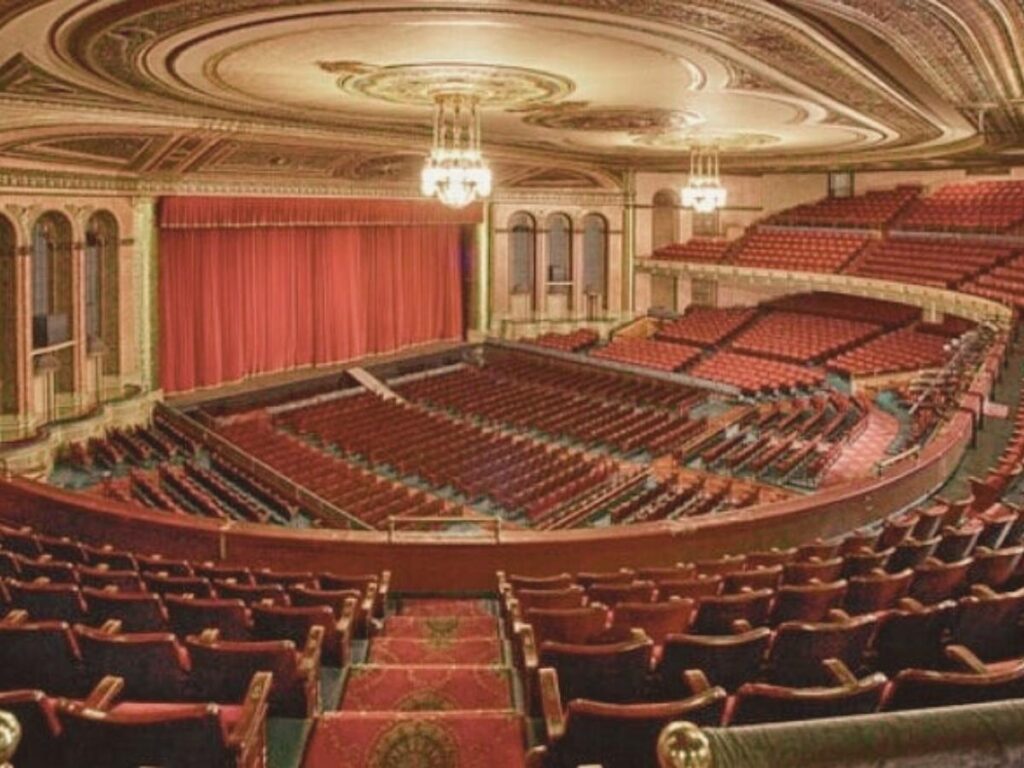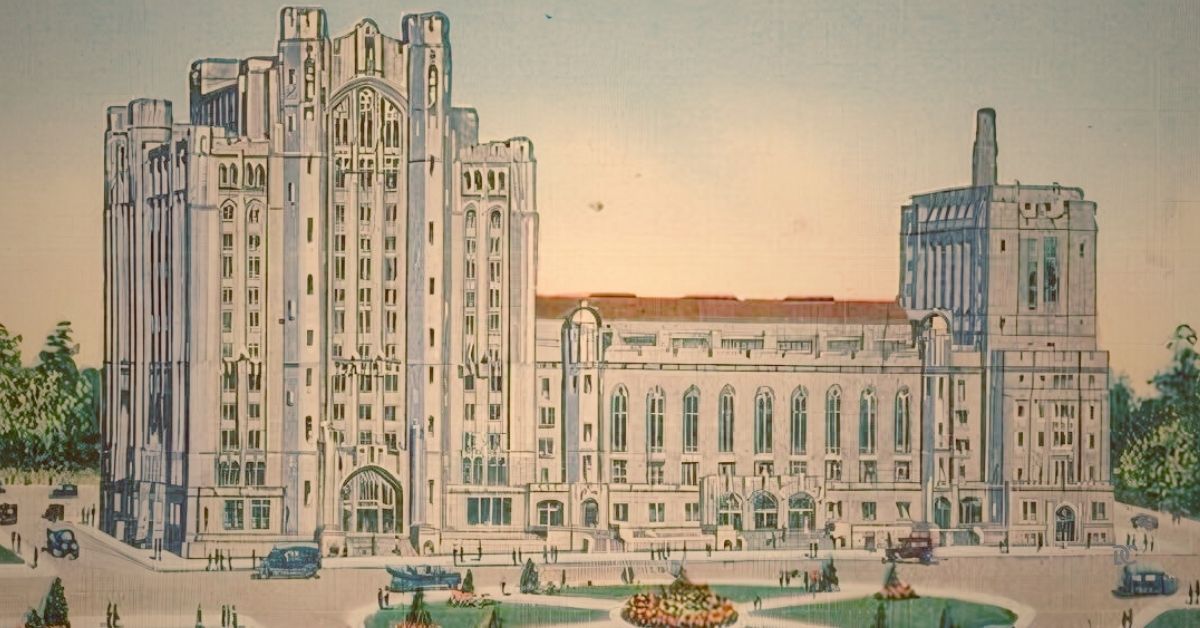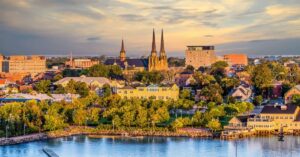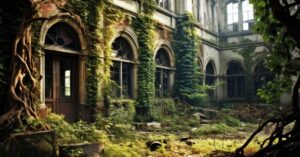Nestled in the heart of Detroit at 500 Temple Street, the Detroit Masonic Temple is a testament to architectural grandeur and historical significance. Renowned as the world’s largest Masonic Temple, this neo-Gothic marvel has been a cornerstone of Detroit’s cultural and social landscape since its completion in 1926. Designed by the eminent architect George D. Mason, the temple is a hub for Masonic activities and a cherished venue for many public events.
A Monumental Architectural Achievement
The Detroit Masonic Temple is an architectural feat of unparalleled scale. Rising 210 feet with 16 floors, it encompasses an astounding 1,037 rooms. This colossal structure is a labyrinth of exquisitely designed spaces, each serving a unique purpose. The temple’s façade is adorned with intricate stone carvings and gothic spires, embodying the grandeur of neo-Gothic design.
- Exterior Features: The limestone exterior is embellished with Gothic elements—pointed arches, intricate tracery, and gargoyles. Each stone was carefully crafted to reflect Masonic symbols and allegories.
- Interior Design: Inside, the temple is a treasure trove of craftsmanship:
- Marble Floors and Columns: Imported marble adorns the floors and pillars, adding to the luxury.
- Stained Glass Windows: Custom-designed windows depict various Masonic emblems and historical figures.
- Woodwork: Hand-carved wood paneling and furniture showcase the skill of artisans.
As a functioning Masonic Temple, the building serves as a hub for various Masonic bodies:
- Lodge Meetings: Numerous Masonic lodges hold regular meetings within the temple.
- York Rite Sovereign College of North America: The temple is home to this prestigious Masonic organization, which promotes Masonic education and philanthropy.
Interior Highlights
- Theaters: The temple houses three theaters:
- The Masonic Temple Theatre: The largest of the three, it boasts over 4,400 seats and is famed for having one of the largest stages in the United States. This auditorium has hosted countless concerts, Broadway shows, and cultural events.
- The Scottish Rite Cathedral A smaller yet equally impressive venue with seating for approximately 1,600 guests, often used for ceremonies and lectures.
- The Chapel: An intimate space with seating for around 500, featuring stunning stained-glass windows and a majestic pipe organ.
- Ballrooms: Two grand ballrooms, the Crystal Ballroom and the Fountain Ballroom, are renowned for their opulent décor, crystal chandeliers, and ornate ceilings. These spaces have been the backdrop for elegant weddings, proms, and galas.
- Additional Facilities: The temple also includes a chapel, a drill hall, a library, a dining room, and numerous lodge rooms designed with meticulous attention to Masonic symbolism and tradition.

The idea for the Detroit Masonic Temple emerged from the burgeoning Masonic community in Detroit during the early 20th century. Groundbreaking occurred on Thanksgiving Day in 1920, symbolizing gratitude and hope for the future. The cornerstone was laid in 1922 with great ceremonial fanfare, utilizing a historic trowel once wielded by President George Washington during the construction of the U.S. Capitol—a profound nod to the temple’s Masonic heritage.
Also Read
The temple was officially dedicated on Thanksgiving Day in 1926, marking the culmination of years of dedicated effort and craftsmanship. Masonic members funded The construction entirely, reflecting their commitment and unity.
Beyond its Masonic functions, the Detroit Masonic Temple has been integral to the city’s cultural fabric. It has hosted a diverse array of events:
- Concerts and Performances: Legendary artists such as The Rolling Stones, David Bowie, and The White Stripes have graced its stage. Its acoustics and ambiance make it a preferred venue for performers and audiences.
- Community Events: The temple has been a venue for graduations, auto shows, dance recitals, and conferences, serving as a gathering place for people from all walks of life.
- Film and Television: Its unique architecture has made it a sought-after location for films and television shows, adding to its prominence in popular culture.
Visiting the Detroit Masonic Temple
The Detroit Masonic Temple offers guided tours, allowing visitors to explore its rich history and architectural splendor. Tours are conducted by knowledgeable guides who share fascinating stories and insights into the temple’s past and present.
- Tour Schedule: Tours are offered regularly, with schedules varying based on date and staff availability.
- Tickets: Tickets for tours are available through the official website, themasonic. com. Tour dates are typically announced two to four weeks in advance. Tickets must be purchased online in advance.
- Private Tours: For a more personalized experience, private tours can be arranged with at least one week’s notice, subject to availability. Group rates are available for Masonic organizations and nonprofit groups.
Events and Rentals
The temple’s various spaces are available for event rentals, from concerts and theatrical productions to weddings and corporate events. Its historic ambiance provides a unique setting that enhances any occasion.
Booking Information: Those interested in hosting an event can find more information and contact details on the official website.
Payment Option
The Detroit Masonic Temple accepts various forms of payment at several locations within the venue:
- Accepted Locations: Main Lobby Bars, Box Office, Coat Check, General Store, and Merchandise areas.
- Payment Types: Most U.S.-issued and internationally-issued magnetic stripe or chip cards bearing the Visa, Mastercard, American Express, Discover, JCB, or UnionPay logos are accepted. Apple Pay and Google Pay are also accepted.
- Cash Policy: While cash is accepted at certain locations, others may be cashless. Cash tips are welcomed.
Parking at the Detroit Masonic Temple
While the temple does not have dedicated parking facilities, there are numerous parking options nearby:
- District Detroit Lots: Various paid lots and garages are within walking distance of the temple.
- Street Parking: Metered street parking is available, but re-entry to the venue is not permitted once your ticket has been scanned. Be mindful of parking durations and restrictions.
- Recommendations:
- Arrive early to secure parking.
- Consider using ride-sharing services or public transportation to alleviate parking concerns.
- Note that the venue does not offer valet parking, and staff cannot provide change for meters.
Accessibility
The Detroit Masonic Temple is committed to providing an accessible experience for all guests:
- Wheelchair Access: Accessible entrances and seating are available. It is advisable to contact the venue in advance for specific accommodations.
- Restrooms: Accessible restrooms are located on various floors.
- Assistance: Staff members can assist guests with special needs.
Nearby Attractions
Enhance your visit by exploring nearby Detroit attractions:
- Fox Theatre: A historic performing arts center offering a variety of shows.
- Detroit Institute of Arts: Home to a vast art collection worldwide.
- Comerica Park: Catch a Detroit Tigers baseball game during the season.
- Restaurants and Dining: Detroit’s Midtown and Downtown areas offer many dining options to suit every palate.
Additional Tips for Visitors
- Check the Schedule: Before planning your visit, check the official website for tour dates, event schedules, and ticket availability.
- Book in Advance: Tours and events can sell out quickly. Purchasing tickets in advance ensures your spot.
- Dress Appropriately: The temple is a large building with many stairs and corridors. Comfortable footwear is recommended.
- Photography: Photography policies may vary depending on the event or tour. It’s advisable to inquire ahead of time.
Interesting Facts
- Jack White’s Contribution: In 2013, Detroit-born musician Jack White reportedly anonymously saved the temple from foreclosure by paying off its outstanding tax debt. His identity was later revealed, highlighting his connection to the venue where he had performed and even worked as an upholsterer in his youth.
- Ghost Stories: Like many historic buildings, the temple is rumored to be haunted. Tales of ghostly apparitions and unexplained phenomena add to its mystique, attracting paranormal enthusiasts.
- Restoration Projects: The temple has undergone various restoration projects to preserve its architectural integrity, including roof repairs, façade restoration, and interior refurbishments.
- Architect’s Tribute: Architect George D. Mason included a small statue of himself within the building’s design, a subtle signature of his work.
The Detroit Masonic Temple continues to be a vibrant part of the community:
- Educational Programs: The temple hosts educational tours for schools and organizations, fostering an appreciation for history and architecture.
- Cultural Events: Art exhibitions, cultural festivals, and community gatherings are part of the temple’s diverse event calendar.
- Social Media and Online Presence: Stay updated on upcoming events, tours, and news by following the temple on social media platforms and visiting its official website.
The Detroit Masonic Temple is truly a special place—it’s like a living treasure that reflects our city’s rich history, amazing architecture, and vibrant community spirit! Whether you’re a history lover, an architecture fan, or just looking for something unique to do, the temple has something for everyone.
Visiting the temple, joining an event, or taking a tour lets you enter its fascinating story—a story that keeps growing in the heart of Detroit. Come be a part of it!
For more information on tours, events, or rental opportunities, please visit the official website at themasonic.com or contact the temple directly. Embrace the opportunity to explore this architectural gem and immerse yourself in the legacy of the Detroit Masonic Temple.






